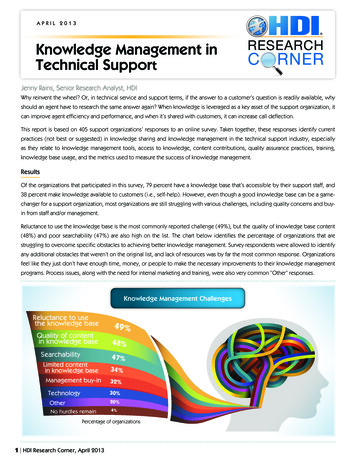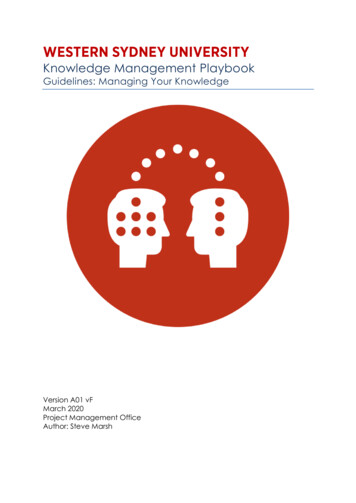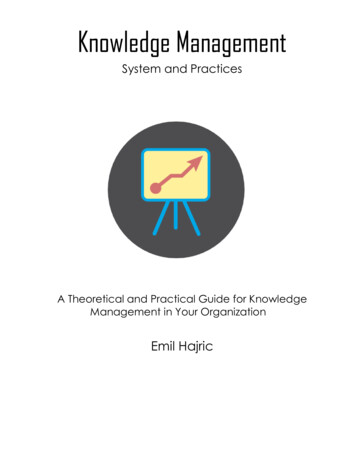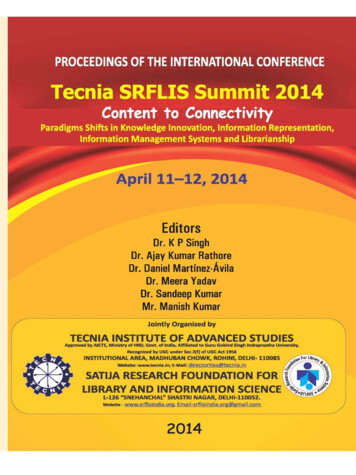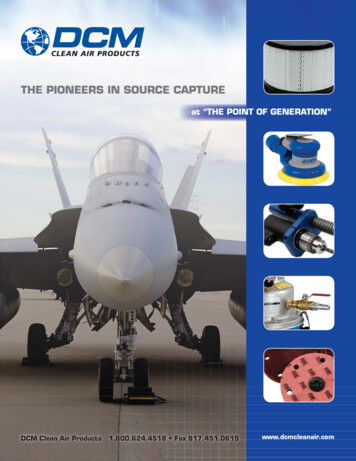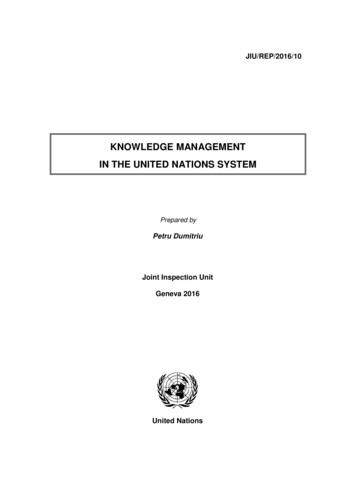
Transcription
JIU/REP/2016/10KNOWLEDGE MANAGEMENTIN THE UNITED NATIONS SYSTEMPrepared byPetru DumitriuJoint Inspection UnitGeneva 2016United Nations
JIU/REP/2016/10Original: ENGLISHKNOWLEDGE MANAGEMENTIN THE UNITED NATIONS SYSTEMPrepared byPetru DumitriuJoint Inspection UnitUnited Nations, Geneva 2016
Project team:Petru Dumitriu, InspectorAlexandra Samoulada, Investigations and Inspection OfficerEleyeba Bricks, Research AssistantAna Sánchez-Terán, InternYichen Xu, InternJozef Masseroli, Intern
iiiEXECUTIVE SUMMARYKnowledge management in the United Nations systemJIU/REP/2016/10Knowledge: a strategic asset of the United Nations systemThe review of knowledge management in the United Nations system is based on the conviction thatknowledge is a valuable core asset of the United Nations system organizations and their bestcomparative advantage. The effective utilization of knowledge both in the organizations and systemwide is critical for achieving the goals of the system.For the United Nations, knowledge constitutes an intangible and a concrete asset, an operational realityand a permanent aspiration, a general and a specific resource. The United Nations system is thegenerator and catalyst of a special kind of knowledge — one that is based on values. It is knowledgethat makes cooperation possible among Member States — irrespective of their size and location — inso many areas of high complexity and diversity. Knowledge is acquired from lessons learned togetherwith new ideas and concepts.Purpose of the reviewThe main purpose of the review was to identify best practices to be considered, emulated and adaptedin accordance with the resources and needs of each organization. From that perspective, the modestpurview of the present report is a knowledge management exercise in itself as it showcases initiativesand experiences that already exist in the United Nations system.The Inspector recommends solutions and proposes new approaches with respect to the system-widerecommendations made in JIU/REP/2007/6 on the same topic, which have not been implemented. Healso recommends a common definition of knowledge management to be used by all United Nationssystem organizations and a minimum set of basic guidelines to assist each organization in thedevelopment of its own knowledge management strategy.Knowledge management in the United Nations system: still work in progressAs a strategic resource, knowledge requires ongoing continual assessment of its use by means of aneffective and productive management in order to ensure that it is optimal. Knowledge managementremains a challenge for the United Nations system organizations in their attempt to systematically andefficiently develop, organize, share and integrate knowledge to achieve their cross-cutting goals.Knowledge management is not yet a strategic priority in all United Nations system organizations andthere are no common practices that are accepted or shared system-wide. Nevertheless, someorganizations, such as the United Nations Development Programme (UNDP), the International AtomicEnergy Agency (IAEA), the International Fund for Agricultural Development (IFAD) and theInternational Labour Organization (ILO) have comprehensive and time-tested practices, andknowledge management is part of their operational reality. Existing knowledge management strategiesare continually adjusted and reformulated in the light of lessons learned from their implementation.
ivConceptual clarificationsThe chapter on conceptual background offers clarifications of basic concepts, such as data, informationand knowledge. A wide array of specific mandate-oriented definitions of knowledge and knowledgemanagement has been extracted from existing strategies and may be used to inspire otherorganizations.The knowledge management strategies reviewed already represent a solid corpus of examples withmany essential similarities, despite the diversity of the contexts in which they are used. The review ofthe conceptual approaches of various organizations proved that the lack of a common terminology isnot a major obstacle in the pursuit of coherent and compatible system-wide approaches to knowledgemanagement, provided that there is an underlying vision.A knowledge management preparedness frameworkThe review used an ad hoc framework to assess the preparedness for knowledge management, basedon five criteria:(a) The existence of a strategy and/or policy document and/or guidelines aimed at defining,institutionalizing and operationalizing knowledge management;(b) The integration, alignment or programmatic connection of such documents with otherstrategies and plans of action;(c)The explicit attribution of specific knowledge management-related responsibilities andcompetences to various units, managers and staff members;(d)The existence of policies aimed at enhancing the proactive engagement of staff inknowledge management;(e)The existence of direct or indirect positive impact on the efficiency of the organization’soperations.The need for a strategic visionThe review found that the main common element of a preparedness framework is the existence of avision of knowledge management, irrespective of the form in which such vision is expressed. Indeed,some organizations have already adopted knowledge management strategies and, following differentpaths, have put in place basic elements of knowledge management at the conceptual or operationallevel. Where such strategies exist they include, to different extents, policies and measures addressingother elements of the preparedness framework.At present, across the United Nations system, there are enough knowledge management strategies thathave stood the test of time and relevance. Those strategies were developed by organizations that havecomplex institutional structures at headquarters, regional and national levels, and they can inspire orhelp other organizations in developing their own strategies as their scope and content can be adapted tothe specific mandates of different organizations. The intellectual resources necessary to developknowledge management strategies exist in all the organizations, at headquarters and in the field.Measuring knowledge management impactThe review was not intended to impose a model, but rather to provide examples and appeal to UnitedNations system organizations to introduce and implement knowledge management strategies andpolicies based on existing practices in the United Nations system. However, unlike other policies thatcan be justified in terms of explicit and measurable monetary savings, the added value of knowledgemanagement is more difficult to quantify. Measuring the impact of knowledge management is a major
vchallenge in designing and implementing knowledge management strategies and policies.Knowledge management benefits are both far reaching and hard to measure. Knowledge managementprevents waste of money, time and human resources and one cannot measure what is prevented. It isdifficult to quantify the time spent in, or the cost of, finding the right information or reproducingknowledge that already exists or using obsolete instead of up-to-date information or investing intechnology without assessing its potential to improve the availability and accessibility of knowledge.Overspending money is easily detected, but overspending time is almost neglected. Knowledgemanagement benefits are not achieved directly nor overnight. The prevention of errors and the savingsthat are often achieved through better use and reuse of existing knowledge are practically invisible inaccounting terms.Negative consequences of ignoring knowledge management needsIt is easier to identify and underline the risks of not adopting a knowledge management strategy. Somenegative consequences of ignoring knowledge management needs were identified during the interviewsconducted by the Inspector with managers and representatives of staff associations, for example:duplication of efforts and activities by staff working in similar fields; inconsistency in the approachesor understanding of the same policy area; lack of awareness of the whole picture of a particular policychallenge; loss of knowledge and insight when experienced staff leave an organization; insufficientability to share best practices and innovations; absence of interdepartmental or inter-agencycollaborative work; failure to identify loss of time and resources.Reinvention of the wheelIn order to reduce costs, organizations — large and small — need to continuously improve the waythey capture, share and deliver their intellectual capital across departments, units, sectors andfunctions, at headquarters and in the field. Such improvement does not happen systematically andeverywhere across the United Nations system. Some organizations still seem unable to extractthemselves from costly functional silos and, instead, tolerate expensive duplications and reinventionsof the wheel. The proliferation of uncoordinated or difficult to access repositories has often had anegative impact on staff’s and decision makers’ ability to find relevant content quickly as well as onthe overall cost of content.Knowledge management is less and less an optional tool for leadersKnowledge management can be a very valuable tool not only for the executive heads of theorganizations, but also for the governing bodies. Knowledge management helps to qualify and identifywhat the organization knows, where and in what form the knowledge is located, how organized is theaccess to knowledge and what are the best ways to transfer knowledge to the right people at the righttime. Knowledge management will help organizations learn from past failures and successes, redeployand reuse existing knowledge assets, solve problems or innovate, foster and develop the rightcompetencies, update and remove obsolete knowledge and ensure that knowledge and competenciesare not lost.Most of the United Nations system organizations consider themselves “knowledge-based”entities, yet they focus on explicit and quantifiable knowledge onlyAt present, there is an almost consensual view that knowledge is the main force that determines anddrives the ability of private and public organizations to act efficiently, based on their comparativeadvantage in a highly competitive environment. Yet, one problem persists: many managers andprofessionals tend to focus on explicit and quantifiable knowledge only. Indeed, while well-
vifunctioning information, archives and records management systems are part of effective knowledgemanagement, even in the case of explicit knowledge, there is no consistent concern about the loss ofknowledge in the process, from its creation to its use. There is also no formal control of the associatedrepetitive costs. Moreover, there are insufficient policies in place to retain tacit knowledge associatedwith human resources, which are subject to various forms of mobility.Knowledge management within existing resourcesAn underlying assumption of the present report is that knowledge management can be improved withinexisting resources. Without ignoring the possible need to invest financial resources in knowledgemanagement, the review paid special attention to the role of human resources as the prevailing factor inknowledge management processes. The Inspector believes that there is a latent virtuous circle that canbe activated to valorise knowledge and human resources that are currently underutilized in eachorganization and system-wide. Efficient management of knowledge does not depend only ontechnology, but mainly on the human and managerial resources of the organization.Knowledge management is — par excellence — a participative process, in which the personalproactive attitude of knowledge workers is essential. Formal action is a sine qua non condition, butwithout conscious involvement and awareness on the part of staff, a knowledge management systemwill not produce the expected results. Decisions and empowering guidelines and frameworks areessential to stimulate staff’s involvement in knowledge creation, sharing and use.Moreover, when organizations do not have policies aimed at retaining the institutional memoryacquired by their staff over long years of individual and organizational practice, the loss of such tacitknowledge represents a devaluation of the human imprint on knowledge resources. Most of theinterlocutors interviewed during the review admitted that there were losses and waste.The survey on staff perception of knowledge management showed that the introduction andimplementation of knowledge management strategies and practices had robust popular support in theUnited Nations system organizations.Knowledge management in the context of the 2030 Agenda for Sustainable DevelopmentThe review found that knowledge management would be an important contribution to theimplementation of the new holistic and collaborative approach on which the 2030 Agenda forSustainable Development is based. Indeed, knowledge can break down silos and be the most naturalintegrative factor system-wide and for all the stakeholders in the implementation of the 2030 Agenda.The United Nations is not just an honest broker and facilitator for donors and recipients ofdevelopment assistance. The United Nations is a catalyst and a disseminator of knowledge. Knowledgemanagement can be used as a tool for promoting interdepartmental, system-wide and multi-stakeholdercollaboration. The present report contains information on good practices and initiatives in the area ofknowledge management that can be utilized to improve access to knowledge and to bring together theinputs of the various stakeholders involved in sustainable development activities.Action to be takenThe recommendations follow the structure of the preparedness framework and are aimed at enhancingthe role of knowledge management in the service of the 2030 Agenda.In view of their overarching goal, the recommendations can be clustered as follows:
vii Filling the gaps in knowledge management system-wide, based on existing practices(recommendations 1 and 2);Valorising human resources and the knowledge acquired by staff in their organizations(recommendations 3 and 4);Stimulating common system-wide initiatives, in general, and in the specific context of the2030 Agenda for Sustainable Development (recommendations 5, 6, and 7).Recommendation 7 is addressed to the General Assembly, recommendations 2 and 5 are addressed tothe Secretary-General, in his capacity as head of the United Nations Secretariat, and recommendations1, 3, 4 and 6 are addressed to the executive heads of the United Nations system organizations. Whenappropriate, The Inspector has made recommendations on actions to be taken in relation to the needsand resources of the organizations.RecommendationsRecommendation 1The executive heads of the United Nations system organizations, if they have not already done so,should develop knowledge management strategies and policies aligned with the mandate, goalsand objectives of their respective organizations, by the end of 2018. Such strategies should bebased on an assessment of current and future knowledge management needs and includemeasures for implementation.Recommendation 2The Secretary-General, in consultation with the Senior Management Group, should develop atleast a minimum set of knowledge management guidelines for the United Nations Secretariat,based on best practices and experiences in departments as well as in United Nations funds,programmes and specialized agencies, and the International Atomic Energy Agency (IAEA), bythe end of 2018.Recommendation 3The executive heads of the United Nations system organizations, if they have not already done so,should take incremental measures aimed at embedding knowledge management skills andknowledge-sharing abilities in their respective staff performance appraisal systems, annual workplans, job descriptions and organizational core competences, by the end of 2020.Recommendation 4The executive heads of the United Nations system organizations, if they have not already done so,should establish norms and procedures for the retention and transfer of knowledge fromretiring, moving or departing staff, as part of the organizations’ succession planning processes.Recommendation 5The Secretary-General should take measures to optimize the potential of the United NationsSystem Staff College Knowledge Centre for Sustainable Development by, inter alia, requestingthe United Nations Institute for Training and Research (UNITAR), the United Nations ResearchInstitute for Social Development (UNRISD), the United Nations University (UNU) and the UnitedNations System Staff College Knowledge Centre for Sustainable Development to jointly designand conduct training programmes on knowledge management adapted to the holistic principles
viiiunderlying the 2030 Agenda for Sustainable Development. Such training programmes shouldpromote, in an integrated way, the management of knowledge produced and intended for use byall stakeholders interested in or associated with the activities of the United Nations system.Recommendation 6The executive heads of the United Nations system organizations with long-standing andcomprehensive experience in knowledge management should take the lead in introducing in theagenda of the United Nations System Chief Executives Board for Coordination (CEB) an itemdedicated to knowledge management so as to provide an opportunity for sharing, at a strategiclevel, experiences, good practices and lessons learned, with a view to gradually developing acommon, system-wide knowledge management culture.Recommendation 7The General Assembly should include in its agenda an item or sub-item dedicated to knowledgemanagement in the United Nations system and request that a report be submitted by theSecretary-General, with contributions from members of the United Nations System ChiefExecutives Board for Coordination (CEB), on system-wide best practices and initiatives in thearea of knowledge management that support the holistic, integrated and collaborative approachof the 2030 Agenda for Sustainable Development.In addition, the Inspector has made the following suggestions and soft recommendations in paragraphs136, 177, 190, 197, 231, 241 and 260 of the present report: The executive heads of the United Nations system organizations, if they have not already doneso, should assign responsibilities relating to the implementation of knowledge managementand the monitoring of the knowledge resources at the corporate level. The organizational formthat the assignment of such responsibilities takes (for example, separate units,interdepartmental teams, individual officials or other) should correspond to the specific needsof each organization and be adapted to the available resources (paragraph 136). The executive heads of the United Nations system organizations, if they have not already doneso, should recognize, acknowledge and stimulate knowledge sharing by developing viablemoral incentives or symbolic rewards to encourage and acknowledge the work of knowledgepromoters among their staff (paragraph 177). The executive heads of United Nations system organizations should sponsor the use ofcommunities of practice in their respective organizations, as a means of stimulating interaction,knowledge sharing and solution searching within their respective organizations and systemwide. To do that, they should, in particular, task the communities of practice with debating,brainstorming and reporting on topics in their areas of expertise and take their conclusions intoaccount, when appropriate, in decision-making (paragraph 190). The executive heads of the United Nations system organizations should consider taking stepsto disseminate the knowledge management toolkits produced by other United Nations systemorganizations for use, as appropriate, in their respective organizations (paragraph 197). The executive heads of the United Nations system organizations should encourage knowledgebrokers in their respective organizations to migrate to the One UN Knowledge ExchangeNetwork on Yammer, to utilize the platform and to report back on its strengths and weaknessesas well as on its potential to become a system-wide collaborative platform (paragraph 231).
ix The experience acquired by the pioneering organizations in the area of metrics and the impactof using knowledge management indicators should be shared among communities of practice,and the conclusions should be reported on to the top managerial level (paragraph 241). The Secretary-General of the United Nations should identify, analyse, and promote thoseknowledge management initiatives and innovative actions taken outside the United Nationssystem by non-governmental organizations, private sector entities and academia, which can becoalesced at a system-wide level in support of the implementation of the 2030 Agenda forSustainable Development (paragraph 260).
xCONTENTSPageEXECUTIVE SUMMARY .ABBREVIATIONS AND ACRONYMS .INDEX .iiixiixivParagraphsChapter1I. INTRODUCTION. . 1-10A. Objectives and scope .4-51B. Methodology .6-10 - Ely, the 2Editor added A & BII. CONCEPTUAL BACKGROUND . .11-47A. Knowledge management . 16-35B. Knowledge .36-47347III. CHALLENGES. .48-62A. System-wide challenges .48-51B. Organizational challenges: a case study .52-54C. Preparedness framework.55-57D. Staff perception of knowledge management .58-621010111213IV. KNOWLEDGE MANAGEMENT STRATEGIES ANDPOLICIES .63-113.A. Why are knowledge management strategies useful? .63-69B. Developments system-wide since the 2007 JIU reporton knowledge management .70-74C. Pioneering work in knowledge management in theUnited Nations system .75-81D. Stand-alone knowledge management strategies in force .82-95E. Other knowledge management-related policies.96-103F. Knowledge management in the United NationsSecretariat .104-113V. INTEGRATION OF KNOWLEDGE MANAGEMENT114-118IN OVERALL ORGANIZATIONAL STRATEGIES .119-153VI. ATTRIBUTION OF RESPONSIBILITIES .A. Human resources assigned to knowledge management .119-136B. Knowledge management as an organizational staffcompetence .137-153VII. ENGAGING STAFF IN KNOWLEDGE154-231MANAGEMENT .A. Knowledge reuse and retention .156-177B. Communities of practice, knowledge networks anddialogue platforms .178-190C. Developing knowledge management skills .191-197D. Improving access to knowledge.198-209E. Emerging initiatives in knowledge management for the2030 Agenda for Sustainable Development .210-216F. Towards a system-wide collaborative platform: a casestudy .217-231151516171820232628283034343739404244
xiVIII. MEASURING THE IMPACT OF KNOWLEDGE232-242MANAGEMENT .A. The challenge of measurability.232-235B. Incipient practices .236-241C. External recognition .24246464648243-260IX. CONCLUSIONS AND WAYS FORWARD .A. Why is knowledge management needed? .243-252B. Knowledge management: breaking down silos in thecontext of the 2030 Agenda for SustainableDevelopment .253-260494951ATTACHMENTS1. Glossary .2. Overview of actions to be taken by participatingorganizations on the recommendations of the JointInspection Unit.ANNEXES545753Annexes I-II are published only on the JIU website (www.unjiu.org) together with the reportI. The results of the survey on perception of knowledge management in the UnitedNations systemII. Technology platforms and other tools used for knowledge exchange in the UnitedNations system
xiiABBREVIATIONS AND NODCUNOPSUNRISDUNUUNVUN-WomenUnited Nations System Chief Executives Board for CoordinationClimate Knowledge BrokersDepartment of Field SupportDevelopment Operations Coordination OfficeDepartment of Political AffairsDepartment of Peacekeeping OperationsEconomic Commission for AfricaEconomic Commission for Asia and the PacificEconomic and Social Commission for Western AsiaFood and Agriculture Organization of the United NationsHigh-level Committee on ManagementHigh-level Committee on ProgrammesInternational Atomic Energy AgencyInternational Civil Aviation OrganizationInformation and communications technologyInformation and Communications Technology NetworkInternational Fund for Agricultural DevelopmentInternational Labour OrganizationInternational Trade CentreInternational Training Centre of the International Labour OrganizationInternational Telecommunication UnionJoint Inspection UnitKnowledge Management AustriaMultilateral Organization Performance Assessment NetworkUnited Nations Office for Coordination of Humanitarian AffairsOrganization for Economic Cooperation and DevelopmentOffice of the United Nations High Commissioner for Human RightsOffice of Information and Communications TechnologyOffice of Internal Oversight ServicesSwiss Knowledge Management ForumJoint United Nations Programme on HIV/AIDSUnited Nations Convention to Combat DesertificationUnited Nations Framework Convention on Climate ChangeUnited Nations country teamUnited Nations Conference on Trade and DevelopmentUnited Nations Development GroupUnited Nations Development ProgrammeUnited Nations Environment ProgrammeUnited Nations Educational, Scientific and Cultural OrganizationUnited Nations Population FundUnited Nations Human Settlements ProgrammeUnited Nations Children’s FundUnited Nations Industrial Development OrganizationUnited Nations Institute for Training and ResearchUnited Nations Office on Drugs and CrimeUnited Nations Office for Project ServicesUnited Nations Research Institute for Social DevelopmentUnited Nations UniversityUnited Nations Volunteers programmeUnited Nations Entity for Gender Equality and the Empowerment of Women
xiiiUNWTOWFPWHOWIPOWMOWorld Tourism OrganizationWorld Food ProgrammeWorld Health OrganizationWorld Intellectual Property OrganizationWorld Meteorological Organization
xivINDEXEntityPage SCOUNFPAUN-HabitatUNICEFUNIDOUNITARUNODCUNOPSviii, 1, 4, 16, 31, 51438, 18, 24, 26, 27, 28, 30, 32, 35, 36, 3724, 26, 30, 368, 18, 24, 26, 27, 28, 30, 32, 35, 36, 37456, 9, 18, 20, 26, 28, 29, 37, 38, 42, 46, 4798, 18, 20, 26, 28, 34, 46, 4718, 411, 161, 16iii, vii, 2, 6, 16, 17, 18, 19, 25, 26, 28, 29, 34, 35, 38, 40, 4836iii, 17, 18, 20, 26, 31, 46, 47iii, 5, 17, 18, 26, 28, 31, 36, 38, 39, 431, 1639, 4321, 26, 28, 29, 38iii, x, xi, 1, 2, 3, 4, 7, 10, 13, 15, 16, 17, 19, 21, 23, 24, 31, 45, 52, 5344, 485025, 26, 33, 36, 383033, 39, 402319, 21, 23, 24221, 26, 28, 3130, 40294245iii, 6, 11, 18, 26, 28, 32, 36, 37, 39, 41, 42, 44, 45, 46, 47, 486, 18, 19, 26, 28, 32, 406, 18, 19, 26, 28, 29, 32, 36, 489, 18, 20, 26, 28, 29, 31, 34, 35, 38, 395, 6, 18, 19, 26, 4820, 26, 28, 29, 33, 36, 38, 39, 40, 44, 451, 16, 32, 35vii, 4321, 26, 3921, 26
xvUNRISDUNUUNVUN-WomenUNWTOWFPWHOWIPOWMOvii, 43vii, 432828, 383818, 20, 3518, 39, 406, 9, 18, 19, 26, 32, 3721, 22, 26
1I. INTRODUCTION1. As part of its programme of work for 2016, the Joint Inspection Unit (JIU) conducted a reviewof knowledge management in United Nations system organizations. The proposal for the reviewwas made by the United Nations Industrial Development Organization (UNIDO). The assessmentof knowledge a
knowledge management strategies exist in all the organizations, at headquarters and in the field. . archives and records management systems are part of effective knowledge management, even in the case of explicit knowledge, there is no consistent concern about the loss of knowledge in the process, from its creation to its use. .




